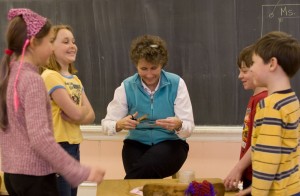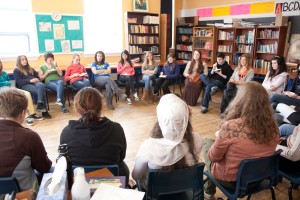School faculty work closely with students and parents to ensure that each child has the opportunity for significant and meaningful involvement in the learning process and the social environment of the school. Class sizes generally range from 12 – 20 students, allowing for individual attention and hands on learning, both in classes and through field trips. A wide range of subjects is offered at all grade levels.
 Treasuring the magic and openness of childhood, Elementary students’ mastery of academic skills is nestled in a friendly, supportive environment in which both academics and personal growth are woven together into a fully integrated whole. Students experience knowledge as a natural part of their lives and develop a foundation for a lifelong love of learning.
Treasuring the magic and openness of childhood, Elementary students’ mastery of academic skills is nestled in a friendly, supportive environment in which both academics and personal growth are woven together into a fully integrated whole. Students experience knowledge as a natural part of their lives and develop a foundation for a lifelong love of learning.
Junior High and High School students experience the challenge of a high quality academic curriculum within an intimate and safe environment. Students and teachers develop a close working relationship in which exploration and discovery is a common journey. The Shambhala School maintains a high academic standard that meets and exceeds Nova Scotia Department of Education requirements and held its first grade 12 commencement in 1998. Since that time, students have attended a wide variety of universities all over the world.
The Four Pillars
There are four threads or pillars that run throughout all ages of the Shambhala School curriculum.
Mindfulness – The emphasis on engaging the body, emotions, and cognitive mind in a synchronized, integrated way is the most natural form of mindfulness for young children. Starting in Grade 4 students are introduced to formal mindfulness and awareness meditations, usually in the context of doing art, theatre and music. In the upper school there is further training in the subtleties of mindfulness-awareness in terms of personal mastery, self-awareness, emotional intelligence, and social awareness.
Outdoor Education – The Shambhala School maximizes outdoor experiences as at the foundation of personal strength, a natural appreciation and love for environmental awareness and part of an engaged, hands-on science program.
Arts Integration – The arts are not an extra. They are essential to a deep transformative experience of story, empowered voice, and creative engagement with the world. In the elementary years these are part of the fabric of daily class. In the later years the curriculum adds in expert training from arts/performance professionals while still maintaining a strong integration with the core curricula when it naturally presents itself.
Classical Literature – The elementary curriculum places the myths, legends, fairy tales and allegories of the world’s wisdom traditions at the center of the themes throughout the year. This seminal literature is organized throughout the years to correspond with the developmental journey of the students so that the lessons of the classroom reflect the inner experience of the child and their understanding of the world and themselves.
In the upper school this continues with an emphasis on Shakespeare, Homer, Marcus Aurelius, First Nations study, the Greeks and other essential literature at the core of how we understand ourselves and society.
Extracurricular Activities
Along with regular school activities such as field trips and guest speakers, students have the opportunity to attend special events such as plays, concerts, and gallery exhibits. Additionally, the school plans camping trips where students can experience both a better understanding of the natural world and participate in environmental awareness activities.
Athletics is supported and encouraged by the school. Activities vary year to year based on interest but in the past have included skating trips, hikes, lunchtime intramurals, and after school sports programs. The Shambhala School participates in tournaments with other independent schools in areas such as badminton, cross-country running and track and field.
Other student extracurriculars vary from year to year based on the interests of the students and teacher and parent volunteers. This year offerings include gaga ball, volleyball, Lego Robotics, yearbook, drama club, sewing club, sailing and boat restoration club, Snack Shack, GSA (Gender Sexuality Alliance) and more.
Parent Participation
The heart of the Shambhala School education is teaching, modeling, and experiencing confidence in unconditional goodness for everyone. Out of this confidence in inherent basic goodness arises a culture of kindness, compassion and awareness. The development of “character” and the noble qualities of wakeful citizen-leaders arises from a curriculum that transmits the experience of basic goodness. The journey of expanding beyond personal limitations, engaging in academic rigour, and offering service to society is activated in the context of confidence in our inherent worthiness and intelligence.
The school was founded in 1993 by parents and teachers to provide a high quality education mixed with the experience of genuine delight in learning. As a model of a sustainable, compassionate and aware society, it was intentionally envisioned as an inclusive school of racial, cultural and religious diversity. The educational philosophy borrows heavily from the Waldorf and Montessori traditions with the overarching psychology and social vision coming from the Shambhala tradition.
The Shambhala School takes its name from a mythological kingdom where citizens experience life through kindness and respect, the school and its teachers create an uplifted academic and social environment that explores the sources of the world’s wisdom traditions, the practice of being a community, and the joy coming from the discipline of learning. It is the goal of every faculty member to help students reach their full potential through the development of intellect, intuition, compassion, humour, and self-confidence.

